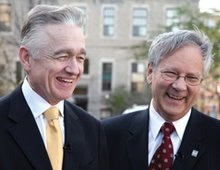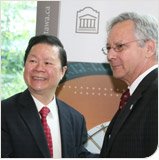Thursday, May 29, 2014
Thursday, May 22, 2014
Why did Regional Senior Judge Charles T. Hackland resign on May 8, 2014?
 |
| Charles Hackland |
[CORRECTION made on June 7, 2014::: In court, on June 6, 2014, Justice Michel Charbonneau stated on the record, in his decision to order a permanent injunction against the defendant in the St. Lewis v. Rancourt lawsuit, that Justice Hackland had sated to those in his entourage in May 2013 that he would be resigning in May 2014. Therefore, it was known by other judges since May 2013 that Justice Hackland would be resigning his position and returning to the bench in May 2014. Consequently, the chronology of events described below cannot be taken as evidence supporting a link between Rancourt's request that Justice Charbonneau recuse himself, and Justice Hackland's resignation.]
By Denis G. Rancourt
How often does a Regional Senior Judge resign, without any explanation?
The media did not report this unusual event. A Department of Justice memo has the terse statement "He resigned from that position effective May 8, 2014."
This is the man who handled some of the most high-profile cases of the last several years. Gone.
He was replaced by Justice James E. McNamara on May 12, 2014, as per the same memo.
I'm going to boldly propose that this resignation-and-replacement was not a mere random event, and that it is related to the on-going defamation case St. Lewis v. Rancourt; that the thematic and chronological relations are not simply coincidences.
On May 6, 2014, I brought a Recusal Motion that was heard and decided by Justice Michel Z. Charbonneau on May 7, 2014. HERE are all the court-filed documents for that motion.
The motion asked Justice Charbonneau to recuse himself from the trial of the St. Lewis v. Rancourt case because the case is all about the University of Ottawa, because the plaintiff's legal fees are paid by the University of Ottawa, because all of Justice Charbonneau's university degrees are from the University of Ottawa, because Justice Charbonneau is a regular and annual donor to the university, because Justice Charbonneau was a law firm partner with the case management judge in the case (Justice Robert Smith, who is barred from being the trial judge), and because there is thus a mutual financial interest between the university and the trial judge (which I explicitly argued orally).
I also argued in my motion that Justice McNamara had set a precedent by recusing himself in a litigation in which the University of Ottawa was a party, because he has a degree from the university (see Justice McNamara's endorsement decision here), and that Justice McNamara had asked Justice Hackland to assign a judge that had no ties to the University of Ottawa in that case. The latter was doubly specified via a separate endorsement signed by Master Calum MacLeod (see here).
And, I showed that I had asked Justice Hackland, back in 2012, to assign a case judge that has no ties to the University of Ottawa, that he answered he would not and that if I had "legitimate" bias concerns to bring them in a motion (see Hackland letters here).
Justice Charbonneau decided the recusal motion the same day that it was heard. He decided to not recuse himself, he was silent on my shared-interests argument, and he stated that if a judge were to recuse himself for the mere reason that he had a degree from the University of Ottawa, that the said judge would be avoiding his duties.
The next day, May 8, Justice Hackland resigned, and on May 12, 2014, he was replaced by Justice McNamara (Justice Department memo).
And, it turns out from the memo, that Justice Hackland practiced with the Gowlings law firm prior to his appointment to the bench in 2003. The law firm representing the plaintiff in St. Lewis v. Rancourt is the Gowlings firm.
Would it not have been simple for Justice Hackland to assign a trial judge that has no ties to the University of Ottawa?
Is it reasonable for me to have a "reasonable apprehension of bias" (legal term meaning a good reason to seek a judge's recusal)?
Cynthia McKinney thinks so: LINK.
Saturday, May 17, 2014
Why I walked out of the trial in which I am being sued
 |
| Media photo -- Ottawa Citizen |
On May 16, 2014, at 10:00 AM, in courtroom #36 of the Ottawa Courthouse of the Ontario Superior Court of Justice I walked out from the trial in which I am being sued, and in which I was representing myself without a lawyer. The trial is continuing in my absence, before a Jury of my peers.
This is my translation from the French of what I said to the Court, to Justice Michel Z. Charbonneau, to explain my reasons for leaving the trial process:
Your Honour, the law foresees that I must be free to advance the very serious charge of “reasonable apprehension of bias”.
It is very difficult for me to make this intervention. Give me five minutes because I must present the new evidence.
During my motion of May 7, 2014, asking that Your Honour recuse himself, Your Honour’s decision was silent on the central point that I had made that Your Honour’s decisions in this action could affect the reputation of the University of Ottawa and affect the monetary value of its scholarships, to which Your Honour donates money regularly and annually.
Then, on the first day of trial, Monday May 12 of this week, we did a motion in the afternoon, a so-called “Voir Dire”, with detailed facta [see all court-filed documents for this motion HERE]. Mr. Dearden [plaintiff's lawyer] brought the motion with a factum of 32 pages served on May 9 and accompanied by a book of authorities of 347 pages. His motion was to eliminate my defence called “Litigation by proxy contrary to the Charter”.
I answered with a factum of May 9 containing 14 pages and accompanied by a book of authorities of 342 pages. I argued in detail that, in fact, my defense was a defence of abuse of process having three branches, with one branch being the “Jameel” defence based on a 2005 decision of the England and Wales Court of Appeal: Dow Jones Inc. v. Jameel, and I pointed to paragraphs 68 to 71 of my “Statement of Defence” as pleading this Jameel defence.
The decision of this Court [of Your Honour] was pronounced on May 14 regarding the said motion or Voir Dire: The paragraphs 61 to 67 of the Statement of Defence were struck. Paragraphs 68 to 71 remained intact, as did my Jameel defence.
Then, on May 15, yesterday, during my Opening Statement, the Court allowed Mr. Dearden to interrupt me when I was explaining my Jameel defence to the Jury. And Your Honour, off the cuff, struck and forbade my Jameel defence despite my protest, and despite the fact of not having done so when Your Honour should have done so if you had had that intension.
It has been more than three years that I have been fighting for procedural justice in this action — and my “Statement of Claim” is struck, cut into pieces, before my eyes during my Opening Statement, in contradiction with the considered decision of May 14 of Your Honour.
This would give nightmares to Kafka himself.
To my eyes, we are no longer in Canada — and we can no longer claim to have a system of justice in this action before you Your Honour.
I am outraged by this gag order imposed in a manner that is apparently arbitrary, which does not allow me to be heard and to “have my day in court”.
I have pleaded “abuse of process” at every step and now, at trial itself, I don’t even have the right to say that the University of Ottawa is entirely financing the plaintiff or the right to use the Jameel defense that applies to situations where the defendant advances a lack of actual damage to reputation, that’s “actual” damage, and to “reputation”, not some other kind of damage.
I was very disturbed by these incomprehensible events, and I have been deeply perturbed all day yesterday; confused also, as a self-represented litigant. This morning I inform the Court that I can no longer participate in such a process.
Therefore, I’m leaving this unjust process. You will take the decisions in my absence. It’s over for me: I’m leaving.
[Followed by an intervention by Mr. Richard Dearden (plaintiff's lawyer) addressed directly to me, my statement to the Court about appropriateness of the said intervention, and my departure from the courtroom.]
Background links:
Ontario Civil Liberties Association public campaign page
All (many) court documents in the case
On May 21, 2014, Cynthia McKinney launched a petition asking for a new trial with a judge that has no ties with the University of Ottawa: SEE PETITION AND NEWS HERE.
Subscribe to:
Comments (Atom)



